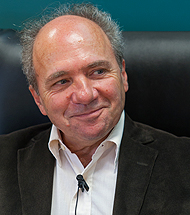Full Professor Gustavo Aucar gives the first seminar of the 17-18 course of group Science, Reason and Faith (CRYF)
The session focused on 'Proposals on the language of Science and its relationship with Nature'.

'Proposals on the language of Science and its relationship with Nature' was the central topic of the September seminar , and the first of the 2017-18 course, organized by the group Science Reason and Faith (CRYF) of the University of Navarra. It counted with the participation of Professor Gustavo Aucar, Full Professor of the department of Physics of the School of Exact and Natural Sciences of the Universidad Nacional del Nordeste (Argentina) and director of the Institute of Modeling and Technological Innovation, IMIT (CONICET-UNNE) of the aforementioned center.
Professor Aucar explained that the development and the applications of the scientific method, from its initial proposal made by Galileo Galilei and Isaac Newton in the mid-17th century to the present day, has allowed humanity to reach a knowledge of Nature that far exceeds its expectations. And he affirmed that this reality fills scientists with astonishment and generates questions that Science does not manage to answer completely or that it does so only in a rudimentary way and from its own particular vision: "It is surprising to think about what may or must 'be behind' what appears with an increasing level of certainty".
Aucar stated that from its most basic formulation, the scientific method has managed to offer us an ever deeper knowledge of what is real and, at the same time, it seems to distance itself more and more from what is given to us as evident a priori by common sense.
In this sense, the exhibition was oriented to highlight some of the most outstanding characteristics of modern science, particularly Physics, and through them what clues appear about the properties that Nature must necessarily possess.
Based on some recent contributions of scientists exploring the possibility of relating science with Philosophy and theology, and on his experience staff, he presented a reflection on the rationality of the laws of nature, their main imprint based on mathematics, the abstraction necessary to reproduce and understand natural phenomena and the level of precision achieved in their description and, as a consequence of all this, the need or the very high probability of the existence of a rationality that supports them. This is usually known as Logos.
Finally, he detailed a proposal staff relative to what happens when one approaches ("touches" intellectually or spiritually) some of the central and deepest elements of creation. What is intuited, and its relation to what is experienced, when one takes contact with the mystery that Christians call the Triune God. The certainties that emerge and that are indicative of the truth of this close meeting with the real, although this mystery remains invisible to the most external senses.





